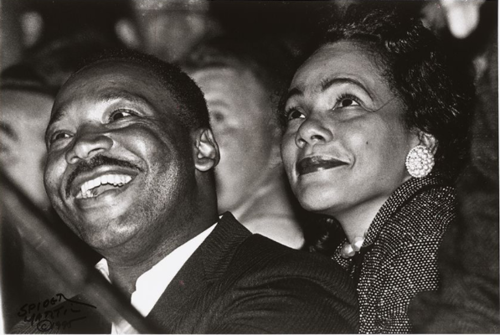
Remembering Radical King
This week we joined millions of other people around the country in celebration to honor and reflect on the legacy of Dr. Martin Luther King Jr. On Twitter, Dr. King’s daughter, Dr. Bernice King (@BeAKing), had this to say about her father:
“Many who quote him now would have hated him then. He was assassinated for trying to eradicate the evils some claim he’d support today. But he was a Christ-centered, love-fueled, justice-seeking, peacemaking, globally-minded, nonviolent revolutionary & prophet.” #MLK90
Considering that commemorations help legitimize claims about the past and construct the future, today we are responding to Dr. Bernice King’s call to reflect on the beautifully complex, rich, and radical legacy of one of our country’s civil rights giants.
Dr. King on Education
There’s no doubt that Dr. King viewed education as a critical civil rights issue. But in the aftermath of Brown v Board of Education of Topeka he called for a “genuine integration”:
“Integration doesn’t just mean the liquidation of everything started and developed by Negroes...there are too many Americans, who think of integration merely in aesthetic and romantic terms where you just add a little color to a still predominantly white-controlled power structure. We must see integration in political terms where there is shared power…Integration must lead us to a point where we share in the power that all of our society will produce.” (King, Martin Luther, Jr. "Revolution in the Classroom, Address delivered to the Georgia Teachers and Educators Association," 1967)
Dr. King on Community
In the final years of his life, Dr. King observed that strides made by the Civil Rights Movement up to that point had been assured support from the federal courts. But as the movement shifted its concerns from the arena of constitutional rights to human rights – i.e. the right to adequate housing, a good education, a livable wage – the approach to achieving these goals would also have to shift:
“To produce change, people must be organized to work together in units of power…More and more, the civil rights movement will have to engage in the task of organizing people into permanent groups to protect their own interests and produce change on their behalf. This task is tedious and lacks the drama of demonstrations, but it is necessary for meaningful results." (Dr. Martin Luther King Jr., Where Do We Go From Here: Chaos or Community?, 1967)
Dr. King on Service
Dr. King observed that professional bureaucracies providing services to the poor could easily become abusive without a commitment to fostering their beneficiaries' “maximum feasible participation”:
“The principle that citizens should have 'maximum feasible participation' in community planning and other decisions affecting their lives is growing. The rights of all parents - not only the wealthy – to have a significant role in educational decisions affecting their children – is still another developing concept. From a variety of different directions, the strands are drawing together for a contemporary Bill of Rights to supplement the constitution’s political Bill of Rights. The new forms of rights are new methods of participation in decision-making.” (Dr. Martin Luther King Jr., Where Do We Go From Here: Chaos or Community?, 1967)
We think that if Dr. King were alive today he would charge us to remain hopeful: "Let us realize that the moral arc of the universe is long but it bends towards justice.” Today, as we remember his legacy, we also draw strength and inspiration from his strategy for moving towards a future where the concept of civil and human rights is pushed to its deeper meanings.
The online FancyText generator will make your words stand out when posting on social media.
